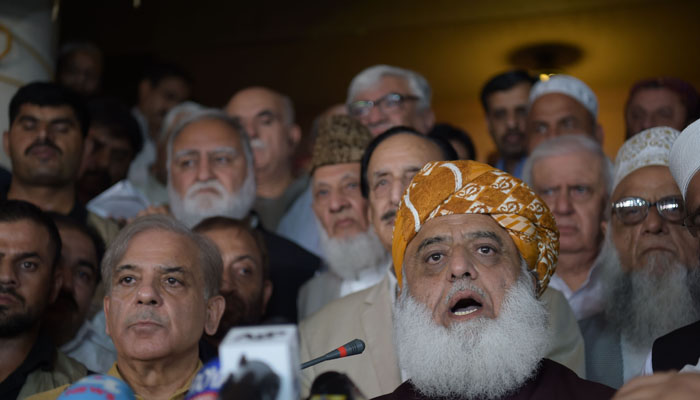What next?
The final election results are in and the path forward for the PTI may not be as smooth as it anticipated. The party holds by far the largest number of seats, winning 115 compared to the PML-N’s 64 and the PPP’s 43. Given that there will be by-elections for four or five seats won by PTI candidates who hold multiple seats, they will need to secure the support of at least 26 other parliamentarians to get a majority in the National Assembly. Even if all 13 candidates who won seats as independents join a PTI-led government, that would still require the support of either the MMA’s 13 seats or that of the MQM-Pakistan and other smaller parties. Horse-trading is such a frequent part of post-election negotiations that one cannot predict the future with any certainty. But for now all major parties other than the PTI are holding firm in their conviction that the elections were massively rigged. On Friday, the PML-N and MMA convened an All-Parties Conference in Islamabad where they rejected the results of the election and demanded a do-over. That demand is never going to be granted but it does put pressure on the other opposition parties to stand united against the results and perhaps even start a protest.
The MMA, despite initiating the APC, is considered the most likely to join hands with the PTI. The MQM-P also has a history of working with the government of the day. The PTI has particular reason to work with the MQM-P. The Sindh government remains with the PPP while the MQM-P has control of Karachi at the local level. The PTI swept the federal and provincial elections in Karachi and will now want some say in the governance of the city. That can only be achieved through an alliance of convenience with the MQM-P. It is notable that both the MQM-P and PPP stayed away from the APC even though they claim they will sit on the opposition benches. The PPP’s allegiances have been open to interpretation over the last few months. It was supportive of the push to force the ouster of the Balochistan chief minister earlier this year and was with the PTI in the vote for the Senate chairman. Now it is decrying the alleged rigging but hasn’t joined hands with the other opposition parties. International observer missions have also made some comment on the media’s role in failing to cover all aspects of the election, mainly as a result of ‘self-censorship’. The EU observer mission in particular commented on this. It also said that while the election largely appeared to be well-organised and conducted on polling day, there were concerns about pre-poll rigging accusations made before it took place. The balance of power is now held by the PPP, MMA and MQM-P and what moves they take next could determine the composition of the government.
-
 Leonardo DiCaprio's Girlfriend Vittoria Ceretti Given 'greatest Honor Of Her Life'
Leonardo DiCaprio's Girlfriend Vittoria Ceretti Given 'greatest Honor Of Her Life' -
 Beatrice, Eugenie’s Reaction Comes Out After Epstein Files Expose Their Personal Lives Even More
Beatrice, Eugenie’s Reaction Comes Out After Epstein Files Expose Their Personal Lives Even More -
 Will Smith Couldn't Make This Dog Part Of His Family: Here's Why
Will Smith Couldn't Make This Dog Part Of His Family: Here's Why -
 Kylie Jenner In Full Nesting Mode With Timothee Chalamet: ‘Pregnancy No Surprise Now’
Kylie Jenner In Full Nesting Mode With Timothee Chalamet: ‘Pregnancy No Surprise Now’ -
 Laura Dern Reflects On Being Rejected Due To Something She Can't Help
Laura Dern Reflects On Being Rejected Due To Something She Can't Help -
 HBO Axed Naomi Watts's 'Game Of Thrones' Sequel For This Reason
HBO Axed Naomi Watts's 'Game Of Thrones' Sequel For This Reason -
 King Charles' Sandringham Estate Gets 'public Safety Message' After Andrew Move
King Charles' Sandringham Estate Gets 'public Safety Message' After Andrew Move -
 Lewis Capaldi Sends Taylor Swift Sweet Message After 'Opalite' Video Role
Lewis Capaldi Sends Taylor Swift Sweet Message After 'Opalite' Video Role -
 Brooklyn Beckham Plunges Victoria, David Beckham Into Marital Woes: ‘They’re Exhausted As It Seeps Into Marriage
Brooklyn Beckham Plunges Victoria, David Beckham Into Marital Woes: ‘They’re Exhausted As It Seeps Into Marriage -
 Sarah Ferguson Joins Andrew In ‘forcing’ Their Daughters Hand: ‘She Can Lose Everything’
Sarah Ferguson Joins Andrew In ‘forcing’ Their Daughters Hand: ‘She Can Lose Everything’ -
 'Bridgerton' Author Reveals If Actors Will Be Recast In Future Seasons
'Bridgerton' Author Reveals If Actors Will Be Recast In Future Seasons -
 50 Cent Super Bowl Ad Goes Viral
50 Cent Super Bowl Ad Goes Viral -
 'The Housemaid' Lifts Company's Profits: Here's How
'The Housemaid' Lifts Company's Profits: Here's How -
 Michael Douglas Recalls Director's Harsh Words Over 'Wall Street' Performance
Michael Douglas Recalls Director's Harsh Words Over 'Wall Street' Performance -
 Henry Czerny On Steve Martin Created Humor On 'Pink Panther' Set
Henry Czerny On Steve Martin Created Humor On 'Pink Panther' Set -
 Lady Victoria Hervey: Andrew Mountbatten-Windsor's Ex-girlfriend Proud Of Being On Epstein Files
Lady Victoria Hervey: Andrew Mountbatten-Windsor's Ex-girlfriend Proud Of Being On Epstein Files




